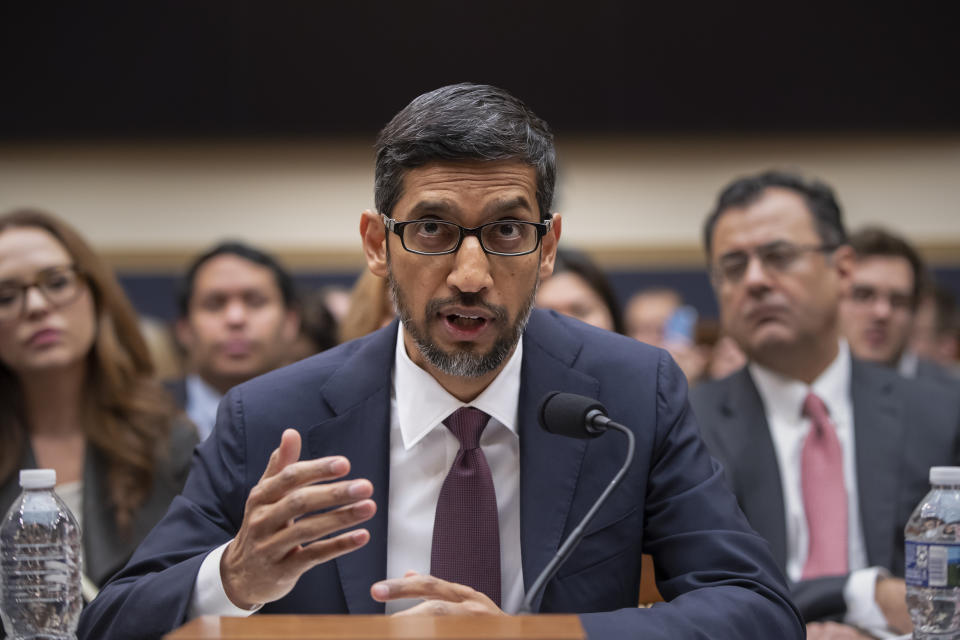Google CEO Sundar Pichai calls for privacy legislation

Google (GOOG, GOOGL) CEO Sundar Pichai took to Capitol Hill on Tuesday to answer questions before the House Judiciary Committee about, among other things, how the company he leads collects the user data of millions of Americans.
The search giant is one of the largest collectors of user data in history, and with a steady stream of data leaks and hacks impacting companies around the world, it came as no surprise that the committee members would push Google for more information on how much data it collects and what the company is doing to ensure the knowledge it has amassed on its users is kept safe.
And while the bulk of the roughly three-and-a-half-hour-meeting may have been more political sideshow than anything else, many of the committee members expressed their dedication to some form of privacy legislation protecting Americans’ data. And so did Pichai.
A U.S. version of GDPR
One of the main points of contention between the committee and Pichai was just how much information Google collects and if users understand the company is doing so or not.
“With Americans carrying their smartphones all day everyday, Google is able to collect an amount of information about its users that would even make the NSA blush,” said Judiciary Chairman Bob Goodlatte (R-Virginia).
“Of course, when users click through the terms of service for these services, they do consent to such collection,” Goodlatte said. “I think it is fair to say that most Americans have no idea the sheer volume of detailed information that is collected.”
Pichai, however, pushed back against suggestions that Google doesn’t inform its users about the data it collects.
“Today for any service we provide our users, we go to greath lengths to protect the privacy and we give them choice and control,” Pichai said.
The hearing follows news that a bug in Google’s failed social network, Google+, allowed third-party app developers to view user profile information even if their profiles were set to private.
Google’s, and all of Silicon Valley’s, collection of Americans’ user data has received increased scrutiny in the U.S. following Facebook’s (FB) Cambridge Analytica scandal, which resulted in the information of millions of Americans being stolen in an attempt to get President Donald Trump elected.
Pichai’s hearing also comes a day after The New York Times published an article detailing how user data can help apps track consumers wherever they bring their smartphones, creating a means for individual users to be identified based on the locations they travel to most often.
“It is important to know what Google is doing to protect its users’ data privacy and data security,” said Congressman Jerrold Nadler (D-New York).
Committee member Eric Swalwell (D-California) came right out and asked Pichai if the U.S. should have a national privacy law, and Pichai said he thinks it should.
“Congressman, I’m of the opinion that we are better off with more of an overarching data protection framework for users, and I think that would be good to do,” Pichai said.
Ease of use
At various points, committee members pressed Pichai about Google’s privacy settings, and the ability of users to control the kind of data they share.
Darrell Issa (R-California) and Steve Cohen (D-Tennessee) asked Pichai if Google is working to make it easier for users to understand how their data is used and how they can turn off data sharing settings.
“I will tell you, each time I have to turn it on and off, refreshing my memory is a pain, because there is no simple place to go to find out how to do it,” Issa said.
Cohen asked for a kind of online school where people could speak to Google representatives to learn about their user privacy settings.
Google does have a Data and Personalization dashboard that allows users to control how their information is shared with the search giant.
Asked whether Google’s dashboard is easy to understand for the average users, Pichai said, “We always think there is more to do — it’s an area which is going to be an ongoing area of effort for us.
“But we have invested a lot over the years, and we do make it very transparent and we encourage users to check it out and every year.”
Despite the agreement between Pichai and lawmakers on the committee on the need for personal data legislation, there still hasn’t been any meaningful movement on getting anything passed. Until that time comes, conversations about a U.S.-style GDPR will remain just that—conversations.
More from Dan:
‘Super Smash Bros. Ultimate’ review: An audacious an accessible fighter
Tim Cook: ‘We won’t give a platform to violent conspiracy theorists’
Microsoft announces live captioning and subtitles for the deaf
Email Daniel Howley at [email protected]; follow him on Twitter at @DanielHowley. Follow Yahoo Finance on Facebook, Twitter, Instagram, and LinkedIn.www.perfectloveletters.com/
